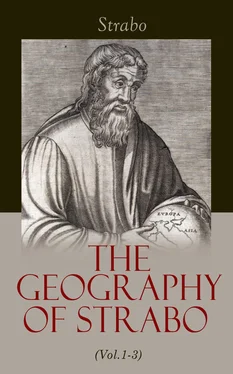Strabo - The Geography of Strabo (Vol.1-3)
Здесь есть возможность читать онлайн «Strabo - The Geography of Strabo (Vol.1-3)» — ознакомительный отрывок электронной книги совершенно бесплатно, а после прочтения отрывка купить полную версию. В некоторых случаях можно слушать аудио, скачать через торрент в формате fb2 и присутствует краткое содержание. Жанр: unrecognised, на английском языке. Описание произведения, (предисловие) а так же отзывы посетителей доступны на портале библиотеки ЛибКат.
- Название:The Geography of Strabo (Vol.1-3)
- Автор:
- Жанр:
- Год:неизвестен
- ISBN:нет данных
- Рейтинг книги:3 / 5. Голосов: 1
-
Избранное:Добавить в избранное
- Отзывы:
-
Ваша оценка:
- 60
- 1
- 2
- 3
- 4
- 5
The Geography of Strabo (Vol.1-3): краткое содержание, описание и аннотация
Предлагаем к чтению аннотацию, описание, краткое содержание или предисловие (зависит от того, что написал сам автор книги «The Geography of Strabo (Vol.1-3)»). Если вы не нашли необходимую информацию о книге — напишите в комментариях, мы постараемся отыскать её.
The Geography of Strabo (Vol.1-3) — читать онлайн ознакомительный отрывок
Ниже представлен текст книги, разбитый по страницам. Система сохранения места последней прочитанной страницы, позволяет с удобством читать онлайн бесплатно книгу «The Geography of Strabo (Vol.1-3)», без необходимости каждый раз заново искать на чём Вы остановились. Поставьте закладку, и сможете в любой момент перейти на страницу, на которой закончили чтение.
Интервал:
Закладка:
4. The country which we are describing is fertile, and irrigated by rivers both large and small, all of which flow from the eastern parts parallel with the Tagus: most of them are navigable and full of gold dust. After the Tagus, the most noted rivers are the Mondego 1130and the Vouga, 1131which are navigable but for a short distance. After these is the Douro, 1132which flows from afar by Numantia, 1133and many other colonies of the Keltiberians and Vaccæi; it is capable of being navigated in large vessels for a distance of nearly 800 stadia. Besides these there are other rivers, after which is the [river] of Lethe, which some call the Limæa, 1134others the Belio, 1135it likewise rises amongst the Keltiberians and Vaccæi. After [Pg 230] [CAS. 153] this is the Bænis, (some call it the Minius, 1136) by far the largest river of Lusitania, 1137being navigable for a distance of 800 stadia. Posidonius says this too rises amongst the Cantabrians. 1138An island 1139lies before its outlet, and two moles affording anchorage for vessels. A natural advantage [of this country] well deserving of commendation is, that the banks of the rivers are so lofty as to be capable of containing the entirety of the water raised by the high tides of the sea, without either being overfilled, or overflowing the plains. This was the limit of Brutus’s expedition. Beyond there are many other rivers parallel to those I have named.
5. The Artabri are the last of the people [on this coast]. They inhabit the promontory called Nerium, 1140which is the boundary [of Iberia] on its western and northern sides. Around it dwell the Keltici, a kindred race to those who are situated along the Guadiana. 1141They say that these latter, together with the Turduli, having undertaken an expedition thither, quarrelled after they had crossed the river Lima, 1142and, besides the sedition, their leader having also died, they remained scattered there, and from this circumstance the river was called the Lethe. 1143The Artabri have besides many cities established round the Gulf, which mariners and those familiar with the places designate as the Port of the Artabri. At the present day the Artabri are denominated the Arotrebæ. About thirty 1144different nations occupy the country between the Tagus and the Artabri. Notwithstanding the fertility of the country in corn, cattle, gold, silver, and numerous other similar productions, the majority of its inhabitants, neglecting to gain their subsistence from the ground, passed their lives in pillage and continual warfare, both between themselves and their neighbours, whom they used to cross the Tagus [to plunder]. To this the Romans at length put a stop by subduing them, and changing many of their cities into villages, besides colonizing some of them better. The mountaineers, as was natural, were the first to commence this lawless mode of life: for living but scantily, and possessing little, they coveted the goods of others, who being obliged to repulse them, of necessity relinquished their proper employments, and instead of pursuing agriculture took up arms. Thus it happened that their country, being neglected, became barren notwithstanding its natural advantages, and inhabited by bandits.
6. The Lusitanians are reported to be clever in laying ambushes, sharp, swift of foot, light, 1145and easily disciplined as soldiers. The small shield they make use of is two feet in diameter, its outer surface concave, and suspended by leather thongs; it neither has rings nor handles. They have in addition 1146a poignard or dagger. Their corselets are for the most part made of linen; a few have chain-coats and helmets with triple crests, but the others use helmets composed of sinews. The infantry wear greaves, each man is furnished with a number of javelins; some also use spears pointed with brass. They report that some of those who dwell near to the river Douro 1147imitate the Lacedæmonians in anointing their bodies with oil, using hot air-baths made of heated stones, bathing in cold water, and taking but one tidy and frugal meal a day. The Lusitanians are frequent in the performance of sacrifice; they examine the entrails, but without cutting them out of the body; they also examine the veins of the side, and practise augury by the touch. They likewise divine by the entrails of captive enemies, whom they first cover with a military cloak, and when stricken under the entrails by the haruspex, they draw their first auguries from the fall [of the [Pg 232] [CAS. 155] victim]. They cut off the right hands of their prisoners, and consecrate them to the gods.
7. All the mountaineers are frugal, their beverage is water, they sleep on the ground, and wear a profuse quantity of long hair after the fashion of women, which they bind around the forehead when they go to battle. 1148They subsist principally on the flesh of the goat, which animal they sacrifice to Mars, as also prisoners taken in war, and horses. They likewise offer hecatombs of each kind after the manner of the Greeks, described by Pindar,
“To sacrifice a hundred of every [species].” 1149
They practise gymnastic exercises, 1150both as heavy-armed soldiers, and cavalry, also boxing, running, skirmishing, and fighting in bands. For two-thirds of the year the mountaineers feed on the acorn, which they dry, bruise, and afterwards grind and make into a kind of bread, which may be stored up for a long period. They also use beer; wine is very scarce, and what is made they speedily consume in feasting with their relatives. In place of oil they use butter. Their meals they take sitting, on seats put up round the walls, and they take place on these according to their age and rank. The supper is carried round, and whilst drinking they dance to the sound of the flute and trumpet, springing up and sinking upon the knees. 1151
In Bastetania the women dance promiscuously with the men, each holding the other’s hand. They all dress in black, the majority of them in cloaks called saga, in which they sleep on beds of straw. They make use of wooden vessels like the Kelts. The women wear dresses and embroidered garments. Instead of money, those who dwell far in the interior exchange merchandise, or give pieces of silver cut off from plates of that metal. Those condemned to death are executed by stoning; parricides are put to death without the frontiers or the cities. They marry according to the customs of the Greeks. 1152Their sick they expose upon the highways, the same way as the Egyptians 1153did anciently, in the hope that some one who has experienced the malady may be able to give them advice. Up to the time of [the expedition of] Brutus they made use of vessels constructed of skins for crossing the lagoons formed by the tides; they now have them formed out of the single trunk of a tree, but these are scarce. Their salt is purple, but becomes white by pounding. The life of the mountaineers is such as I have described, I mean those bordering the northern side of Iberia, the Gallicians, the Asturians, and the Cantabrians, 1154as far as the Vascons 1155and the Pyrenees. The mode of life amongst all these is similar. But I am reluctant to fill my page with their names, and would fain escape the disagreeable task of writing them, unless perchance the Pleutauri, the Bardyetæ, the Allotriges, 1156and other names still worse and more out of the way than these might be grateful to the ear of some one.
8. The rough and savage manners of these people is not alone owing to their wars, but likewise to their isolated position, it being a long distance to reach them, whether by sea or land. Thus the difficulty of communication has deprived [Pg 234]
[CAS. 156] them both of generosity of manners and of courtesy. At the present time, however, they suffer less from this both on account of their being at peace and the intermixture of Romans. Wherever these [influences] are not so much experienced people are harsher and more savage. It is probable that this ruggedness of character is increased by the barrenness of the mountains and some of the places which they inhabit. At the present day, as I have remarked, all warfare is put an end to, Augustus Cæsar having subdued the Cantabrians 1157and the neighbouring nations, amongst whom the system of pillage was mainly carried on in our day. So that at the present time, instead of plundering the allies of the Romans, the Coniaci and those who dwell by the sources of the Ebro, 1158with the exception of the Tuisi, 1159bear arms for the Romans. Tiberius, who succeeded Augustus Cæsar, carried out his intention of placing a military force of three legions in these parts, by which means he has not only preserved peace, but introduced amongst some of them a civil polity.
Читать дальшеИнтервал:
Закладка:
Похожие книги на «The Geography of Strabo (Vol.1-3)»
Представляем Вашему вниманию похожие книги на «The Geography of Strabo (Vol.1-3)» списком для выбора. Мы отобрали схожую по названию и смыслу литературу в надежде предоставить читателям больше вариантов отыскать новые, интересные, ещё непрочитанные произведения.
Обсуждение, отзывы о книге «The Geography of Strabo (Vol.1-3)» и просто собственные мнения читателей. Оставьте ваши комментарии, напишите, что Вы думаете о произведении, его смысле или главных героях. Укажите что конкретно понравилось, а что нет, и почему Вы так считаете.












![Anne Blunt - A Pilgrimage to Nejd, the Cradle of the Arab Race. Vol. 2 [of 2]](/books/750183/anne-blunt-a-pilgrimage-to-nejd-the-cradle-of-the-thumb.webp)